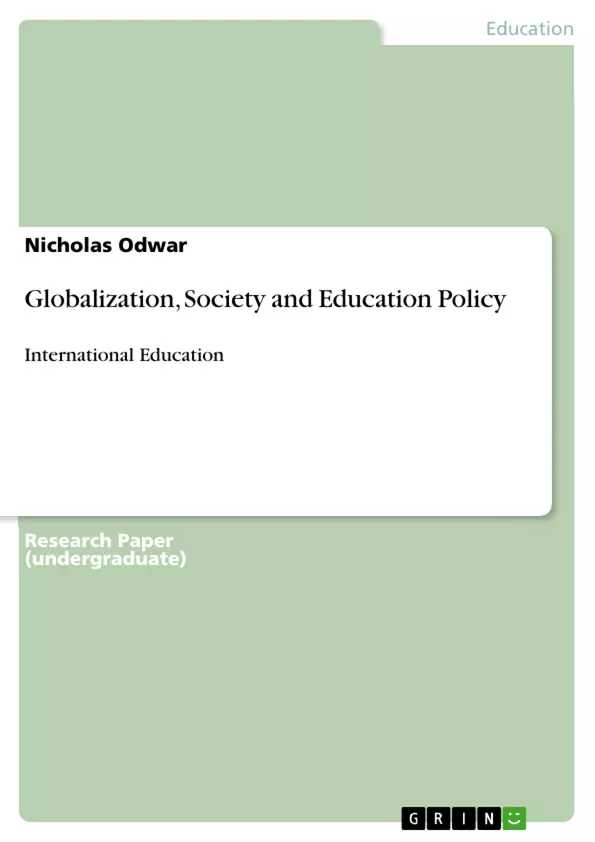The word globalization is often implemented in describing the rising “interdependence” of the world’s economies, cultures as well as populations promoted by the “cross-border” trade in goods and services, technology, and flows of investment, people, and information. It generally defines how trade and technology have made the world become more linked and interdependent place and in its scope, globalization incorporates the economic and social alterations that have emerged as a result. In education, globalization defines the rising mobility of learners and educators across the world, and the desire for the teachers to be more inclusive (Tight, 2021). Globalization of education has assisted in decreasing discrimination, spreading technologies over a broader region, as well as raising awareness of other cultures and languages and allowing people to collaborate easily. This essay practically acknowledges the concept of globalization to comprise set of distinctions by the administration in the interest of the global, national or local development by planning and creating diverse regulations, strategies or policies (Blagorazumnaya, & Trifonova, 2023). In defining the meaning behind a policy, it can be noted that a policy is considered a course or principle of action implemented or planned by a firm or person: The function of a policy in any firm is to offer general guidance concerning the firm’s mission, offer precise guidance toward applying approaches to attain the desired mission, as well as offer a mechanism to regulate conduct of the firm. The policy procedure is often theorized as progressive phases or stages comprising, problem emergence or identification of the issue to be solved by the suggested policy; setting an agenda; construction of the policy also viewed as consideration of policy selections; as well as policy execution and assessment of the policy. It is worth noting that the policy making procedure should as well entail the actions as well as its prospective impacts perfectly (Government of Canada, 2019). In the present globalization era, the value of education has been focused on enhancement of innovation skills, promoting global ties as well as fostering a vibrant economy. The paper focuses on the question: How does the new Canadian policy (International Education Strategy) (IES) strengthens its global education competitive advantage?
Table of Contents
- Abstract
- Introduction
- Policy background
- Relationship between the policy (International Education Strategy) (IES) and globalization
- Promoting prosperity
- Increased competition
- Need for diversification
- Innovation and skills
- Future of work
- Limitations of the International Education Strategy (IES)-policy
- Conclusion
- References
Objectives and Key Themes
This essay explores the Canadian International Education Strategy (IES), a new policy implemented in 2019. It examines how the IES contributes to Canada's global education competitiveness and strengthens its position in a globalized world. The essay analyzes the relationship between the policy and globalization, highlighting its impact on prosperity, competition, diversification, innovation, and the future of work.
- Globalization's impact on education and its role in promoting inclusivity and collaboration
- The importance of policy in guiding national development and fostering a vibrant economy
- Canada's "International Education Strategy" (IES) and its objectives for promoting global competitiveness
- The IES's emphasis on strengthening Canada's workforce skills and promoting global connections
- The role of international education in fostering a thriving economy and supporting a diverse workforce
Chapter Summaries
The essay begins by defining globalization and its impact on education, highlighting its role in promoting inclusivity and collaboration. It then introduces the IES, a policy aimed at strengthening Canada's global education competitiveness. The essay explores the policy's objectives and its relationship with globalization, discussing its impact on promoting prosperity, increasing competition, diversifying the education sector, and fostering innovation and skills development. The essay also touches upon the challenges and limitations of the IES in achieving its goals.
Keywords
Key words and focus topics of this essay include: International Education Strategy (IES), globalization, education policy, global competitiveness, workforce skills, innovation, diversity, and international student mobility.
- Quote paper
- Nicholas Odwar (Author), 2024, Globalization, Society and Education Policy, Munich, GRIN Verlag, https://www.hausarbeiten.de/document/1487283


